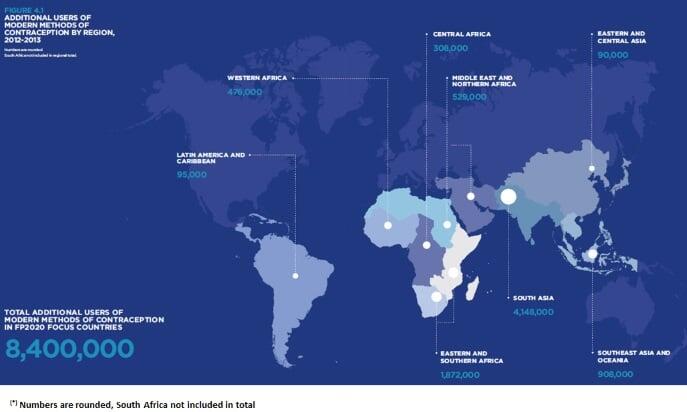More than 8 million new users of modern contraception have been recorded globally since the ground-breaking 2012 London Summit on Family Planning. A significant number of these new users – 1,872,000 or 22 per cent – are located in the East and Southern Africa region.
This was reported in the newly released second FP2020 progress report, entitled Partnership in Progress.
The FP2020 collaboration is clearly working. The data show that in the past two years, FP2020 has made remarkable progress and advances. More women and girls than ever before have access to modern contraceptives. New commitments have been made by countries to FP2020 and there have been increased disbursements from donors, as well as progress across multiple sectors.
However, efforts must be accelerated collectively if 120 million more women and girls are to be reached by 2020.
It was anticipated that growth in family planning would be slowest in the first few years of the initiative as countries and partners expand their programs. In many countries, an enormous effort is required simply to maintain existing levels of service.
The measurement systems established to track global progress have yielded the first set of annual results, as follows:
- Five more countries made commitments to FP2020, bringing the total number of commitment countries to 29 (by November 2013);
- Donor governments disbursed $1.3 billion in bilateral funding for family planning programs—representing an increase of almost 20 per cent since 2012—as well as $460 million in core contributions to UNFPA (2013);
- About 8.4 million additional women and girls used modern contraception compared to 2012. While this number is just below the projected benchmark of 9.4 million additional users in the first year of FP2020, it is a significant milestone;
- In 2013, across the 69 FP2020 focus countries, it is estimated that the use of modern contraception by a cumulative total of 274 million women and girls averted 77 million unintended pregnancies, which is two million more unintended pregnancies averted than in 2012;
- In 2013, 24 million unsafe abortions were averted (compared to 23 million in 2012) and 125,000 maternal deaths averted (compared to 120,000 in 2012). Important progress is being made to overcome barriers and expand access to family planning.
In April 2014, UNFPA and the Bill & Melinda Gates Foundation signed a memorandum of understanding to boost family planning in developing countries.

In the East and Southern Africa region, major milestones were noted, as follows:
- At the 3rd International Conference on Family Planning in Addis Ababa, Ethiopia in November 2013, five new country commitments to FP2020 were announced – by Benin, DRC, Guinea, Mauritania and Myanmar;
- Zambia launched its National Family Planning Scale Up 8 Year Plan;
- DRC launched its Plan Stratégique pour la Planification Familiale 2014–2020 in February 2014 ;
- Accelerating Contraceptive Choice , a regional meeting on family planning goals in East Africa, was held in Nairobi, Kenya in April 2014;
- Tanzania formally launched its Sharpened One Plan (2014–2015) to accelerate progress on its FP2020 commitment and the Millennium Development Goals in May 2014;
- Tanzania doubled its domestic allocation for family planning from TSH 1 billion (2013/2014) to TSH 2 billion (2014/2015);
- The Partnership for Maternal Newborn and Child Health (PMNCH) Partners’ Forum convened in Johannesburg, South Africa;
- Uganda held its national family planning conference in Kampala in July 2014;
- Ethiopia held a three-day conference in Addis Ababa to expedite progress towards MDG 5, on improving maternal health;
- Fifteen county governors in Kenya pledged to accelerate progress towards MDG 5, including access to reproductive health care, in August 2014;
- Tanzania hosted the regional East Africa Share Fair: Knowledge Exchange to Accelerate Progress Toward FP2020’s Goal, in September 2014;
- FP2020 awarded the first Rapid Response Mechanism grant to the Uganda Protestant Medical Bureau for a faith-based advocacy program to increase contraceptive use.
- The 16 FP2020 focus countries for UNFPA East and Southern Africa Region are Burundi, Comoros, Democratic Republic of Congo, Eritrea, Ethiopia, Kenya, Lesotho, Madagascar, Malawi, Mozambique, Rwanda, South Sudan, Tanzania, Uganda, Zambia and Zimbabwe.
The report includes background demographic and socio-economic characteristics relating to countries’ mCPR (annual growth, disaggregated by wealth quintiles, by residence, married women, etc.); unmet needs equally disaggregated as above; per cent of women with unmet need for modern contraception vs. per cent of women whose demand is satisfied; number of unintended pregnancies vs. number of unintended pregnancies due to contraceptive use; number of maternal deaths averted due to contraceptive use and number of unsafe abortions averted due to contraceptive use.




